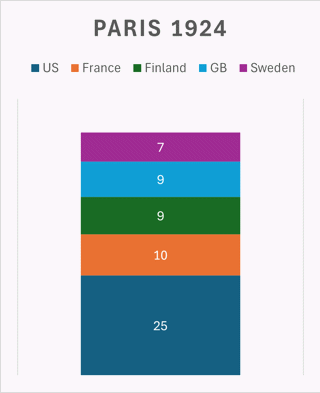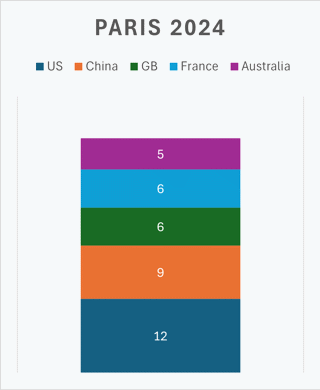Introduction
Whether it’s passion for one, a love for many or an indifference to most, sport plays a significant role in today's society. With events such as the Olympics, Paralympics, Euros, and the T20 Men’s and Women’s World Cups, 2024 has been a remarkable year for a wide range of sport.
This resource explores the impact of sport on various aspects of modern society, with a particular focus on less-frequent events like the Olympics.
Sport and society
The active participation in sport offers a wealth of health and social benefits including improving self-esteem and confidence. On a wider scale, sport can be a major influence in social solidarity and representation.
Football (or soccer) is the largest globally viewed sport in the world. 1.5 billion people watched the Men’s Football World Cup Final in 2022 alone. Sport provides an opportunity for countries, communities, and individuals to come together in shared celebration—or commiseration—of their teams. This unity through sport can greatly impact national pride and foster a strong sense of community. Therefore, the potential for social cohesion through sport is extensive.

Figure 1: Eiffel Tower lit up in celebration at the end of the Opening Ceremony of the Olympic Games, Paris 2024
Sport has long reflected changing social norms and perceptions. A prime example of this is the Paralympics. This event, with its origins from the Stoke Mandeville Hospital Games in the 1940s, was first internationally celebrated in Rome in 1960. Since then, the Games have grown from strength to strength with 1976 seeing the first Winter Paralympics followed by international broadcasting of the Summer Paralympics in Sydney in 2000.
Another reflection of evolving social norms through sport is the increasing recognition of a ‘Masters’ event for athletes over 35. This year, the World Masters Games held in Cleveland in the US and the World Masters Athletics Championships in Gothenburg in Sweden are two such examples. These events celebrate athletes beyond the typical age range, emphasising social collaboration and showcasing accessibility of sports at any age.
In recent years, the visibility and popularity of women's sports have surged. The 2023 Women’s World Cup drew 21.2 million viewers on the BBC alone, and the Women’s Six Nations Rugby in 2024 attracted 8.1 million viewers. Similarly, 7.4 million tuned in for women’s cricket in 2023. The rise of women’s versions of traditionally male-dominated sports has created new opportunities, particularly for nations like the U.S., which excel in women's football. This growing visibility opens more doors for women to pursue professional careers in sports.

Figure 2. U.S. and Korean women’s international football match © Andrea Williams Flickr
With increased participation and global reach, sport has the potential to be a powerful catalyst for social mobility, fostering recognition of diversity and promoting greater understanding across society.
Sport, the economy and legacy
Sport is a major global industry, generating over $403 billion of revenue in 2022. In the same year, a report from the UK’s Department for Culture, Media and Sport, revealed that it contributed to just over £18 billion to the UK Economy, accounting for 0.8% of the nation’s total economic activity. In addition, the sector supports over 550,000 jobs in the UK. Much of the money is generated through sponsorship and membership however, merchandise sales and media subscriptions also contribute to the generated income.
Given these figures, it seems logical to assume that hosting large-scale sporting events would be economically beneficial for any nation. However, this is not always the case, particularly in the short term. Many large sporting events run at an initial financial loss to the host nation, including events such as the Olympics and the Football World Cup. This is largely due to the substantial investment required for infrastructure and sporting venues. As a result, events like the Commonwealth Games are increasingly under threat, as many nations do not consider themselves to be in a position to fund the significant upfront costs.
However, a shift towards more economically sustainable events could be approaching. According to the report from the Conversation in July 2024, by utilising existing infrastructure, building temporary venues and changing the bidding process, the recent Olympics in Paris might in fact turn a profit. The same approach is proposed for the 2028 Olympics in Los Angeles. If the positive correlation of profit or breaking even continues, it could reengage more nations in putting their cities forward in the future.
The long-term economic benefits of hosting can also be significant. Continued tourism to the area and the ongoing use of the sporting facilities can bring financial gain. Although this is harder to attribute to the event itself, the added income can contribute to a positive multiplier effect in the area. For example, Barcelona's Anella Olímpica (Olympic Ring), the site of the 1992 Olympic Games, continues to be used for athletics, football tournaments, concerts, and community activities over 30 years later. This sustained use honours the legacy of the original construction.

Figure 3. Anella Olímpica, Barcelona © Kris Arnold Flickr
Although the initial outlay of sporting events can be costly, the legacy it leaves can be one which benefits the community for decades through the repeated use of the facilities and improved infrastructure. If constructed with sustainability at the forefront, the event could also be profitable.
Sport and politics


Figures 4 and 5: Percentage of total medal count for the top five highest total medals won SOURCE: Olympics.com © RGS
Looking at the data over the past 100 years; the countries that win the most Olympic medals have remained relatively consistent. While there have been fluctuations, the United States has consistently ranked in the top two at almost every Summer Olympic Games, except for two – one of which was due to the U.S. boycott.
The medal table subtly reflects the influence of ‘soft’ economic power. Those countries who have the financial resources to invest in training centres, specialist coaching and medical teams tend to dominate the overall medal counts. Similarly, the location of the Games over the last century have predominantly been held in high-income countries mainly due, in part, the bidding process being an assurance that the hosing country can pay for the Games. As a result, only wealthier nations are likely to bid, leaving low-income countries with fewer opportunities to host.
This economic dynamic has led to a reliance on more developed nations to repeatedly host the Games. For instance, Los Angeles in 2028 will become the third city, after Paris and London, to have hosted the Games three times in the past century.
While the Olympics are often celebrated as a symbol of global unity and cohesion, they have not been immune to political implications. For example, the 1980 Moscow Olympics was boycotted by the US and 60 other countries in protest over the Soviet Union’s invasion of Afghanistan. The following Games were held in Los Angeles where the USSR did not compete due to fear of retribution from their American hosts. Indeed, Russia (or the Soviet Union) has been one of the biggest countries who are sanctioned from attending the Games due to their military hard power involvement meaning that their athletes, if they choose to compete, do so under a banner not affiliated with their country. This highlights the intersection of politics and sport.
Analysing the total medal table changes from 1924 to 2024 provides a snapshot of shifting global power dynamics. During the Cold War, the U.S. and USSR vied for dominance at the top of the table – a symbol of bi-polar powers. More recently, China has risen into the top five, indicating the emergence of other powers and a shift towards a possible multipolar world.



